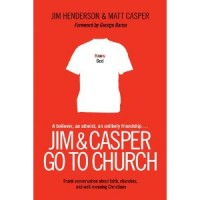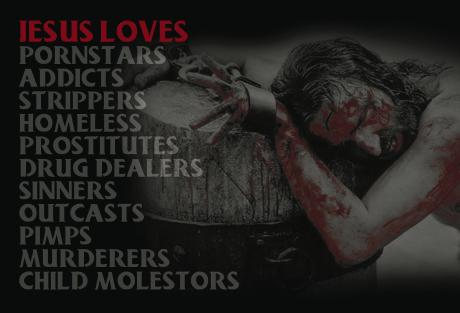When I was a pastor, I wish I’d had the courage to walk across the street.
Oh sure, I walked across it every day back and forth to the church parsonage. But a bit further down the road was an atheist who had never set foot in our church, and probably never would. I wish I had gone over there and asked him out for lunch. It’s one of the great regrets of my years as a pastor. I thought about it every week, but I never had the courage.
 Recently I read Jim and Casper Go to Church.
Recently I read Jim and Casper Go to Church. Jim is a Christian who makes a regular habit of befriending atheists. Casper is an atheist. Together, they attend churches and then write about what they heard and experienced.
If you want to know what unbelievers think about you and your church, you should go ask them. But if you want to read about it instead (since it’s so much safer and easier), you can be like me and just read Jim and Casper’s book, and others like it (e.g., They Like Jesus but Not the Church by Dan Kimball).
 Jim has a ministry called Off the Map devoted to helping “Christians learn to communicate better with non-Christians, or as some of my more outspoken ‘lost’ friends prefer to put it, Off the Map helps Christians learn how to not be jerks” (p. xxii). It’s true. We can be real jerks. I’m sure it makes Jesus proud.
Jim has a ministry called Off the Map devoted to helping “Christians learn to communicate better with non-Christians, or as some of my more outspoken ‘lost’ friends prefer to put it, Off the Map helps Christians learn how to not be jerks” (p. xxii). It’s true. We can be real jerks. I’m sure it makes Jesus proud.
Anyway, here are a few quotes from Jim with comments by me:
Humanity is divided into two groups: (1) people who follow Jesus, and (2) everybody else. It doesn’t matter to me whether you call yourself a Christian, a Buddhist, a humanist, an agnostic, or an atheist. If you aren’t following Jesus, you’re in group two (p. xxiv).
I could be wrong, but I don’t think he means that there can be Buddhists, agnostics, and atheists who follow Jesus. Sure, some may claim to follow the teachings of Jesus, but they would have to reject some of them.
Just like many of us Christians do as well.
And that’s his point. Just because you call yourself a Christian doesn’t mean you are following Jesus. I wholeheartedly agree with that. He goes on to say that “some professed Christians are not actually following Jesus but are instead following religion” (p. xxv). So true. I’m one such person in many ways.
He goes on to say that authors of a generation ago (and even many today):
…Provided Christians a way to defend the faith-the expectation being that if we provide a biblical response to the arguments of atheists of doubters and essentially prove them wrong, they will be forced to admit the error of their ways and join us. (Short of that, we will at least experience the pleasure of intellectually humiliating them.) (p. xxxii).
I’ve been in “witnessing” encounters like this. The only results that I could discern were increased blood pressure, as evidenced by red faces and bulging neck veins. Jim says, “Ordinary Christians like me know that when you start defending the faith, you also start losing your friends” (p. xxxiii).
The solution, Jim says, is to actually make friends with non-Christians, and live out the teachings of Jesus among them:
Jesus didn’t just teach principles; he taught practices. He gave people something to do. He didn’t just teach them about forgiveness; he told them to forgive their debtors. He didn’t just talk about love as a concept; he told people to love their enemies. He didn’t just tell people to think about changing their behaviors; he told them to repent. Sure it’s challenging, but it doesn’t take a weekend seminary to understand what he means (p. xxxiii).
This is a great book. Get your own copy here: Jim and Casper Go to Church.






 To learn about this world we live in, there are a variety of things we can do, but every Christian must be doing something to learn about people we are trying to reach. Though the best way to do this is with developing personal relationships with people, one quick way to learn is through blogs and websites.
To learn about this world we live in, there are a variety of things we can do, but every Christian must be doing something to learn about people we are trying to reach. Though the best way to do this is with developing personal relationships with people, one quick way to learn is through blogs and websites.

 (Note: This post on church planting principles from Will Smith is from 2007… back when I thought I was going into church planting.
(Note: This post on church planting principles from Will Smith is from 2007… back when I thought I was going into church planting. 

